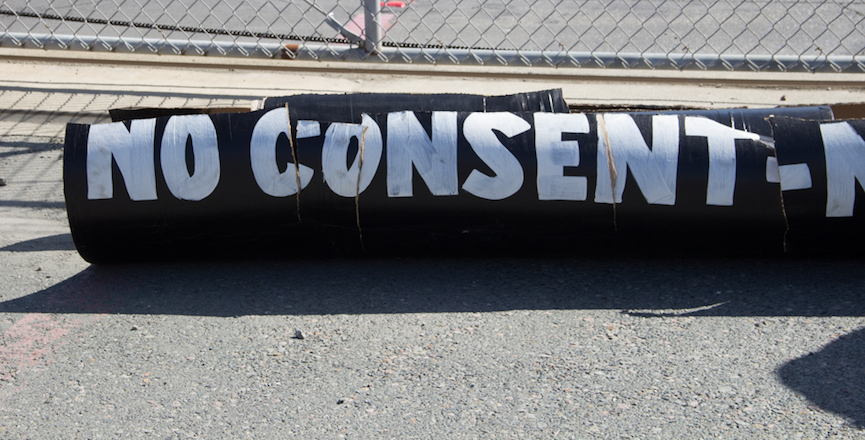Kinder Morgan’s Trans Mountain Pipeline project is dead in the water.
In a stunning blow to the Trudeau government on August 30 — the same day Kinder Morgan Canada shareholders voted to approve Trudeau’s purchase of the pipeline — the Federal Court of Appeal ruled that the government’s National Energy Board (NEB) failed in its legal obligation to consult with Indigenous communities.
We won, Coast Salish people banded together and went to court and defeated the Trans Mountain pipeline. Our leaders meet to celebrate and some of the most important words I have heard in a long time were said: We have laws, when all else fails we have laws. We will protect our land in the same way we protect our children — this is the law. Leave the land the way you found it. this is another law. Consult with us. This is Canada’s Law. Honor the people before us, honor the ancestors. these are teachings. I come from good family.
— Lee Maracle, as posted on Facebook
After years of intense opposition from Indigenous communities, environmentalists, and the province of British Columbia, the court’s decision underscores that environmentally destructive infrastructure and reconciliation with First Nations and Indigenous communities are fundamentally irreconcilable.
“This government played politics with our livelihood,” Squamish spokesperson Khelsilem Rivers told CBC, “They did not behave honourably and the courts agreed every step of the way.”
In celebration of the Indigenous resilience, read Eriel Tchekwie Deranger’s reflections on Indigenous land rights and the power of Indigenous identity.
One of the big challenges is that the consultation process failed to take into consideration the rights of our communities, it failed to live up to the standards that were put forward. What we really need to be thinking about is: what are those current standards? The current standards of consultation are not to accept a ‘yes’ or a ‘no’, but to find ways to mitigate, or to find out how much money our communities are going to take to accept a project that is going to destroy and abrogate our rights as Indigenous peoples.
And we’re not looking for money — we’re looking for the protection and preservation of our lands, and our territories, and our ecosystems. For the preservation of our culture and our identities. Our identities are intrinsically linked to these places. We want a fair and equitable process that recognizes our lands and territories as a part of our identities. We as a human race identify as place, and as Indigenous people, that identification with place is rooted in our spirituality and our religions, and we can’t rob that of our people. […] And when you destroy these places, you are destroying part of our identities. So when we talk about protecting our rights as Indigenous peoples, we’re talking about protecting our cultural rights, we’re talking about protecting our identities, and we’re talking about protecting lands and ecosystems. There is no amount of money, there is no amount of mitigation that can protect their territories from the risks that these pipelines bring to their lands.
— Eriel Tchekwie Deranger, as posted on Facebook video
And on rabble, read Brent Patterson on the Secwepemc Nation’s resistance and Trudeau’s failed logic on environmental policy.
Far from governing for the people, Linda McQuaig writes that Ford’s government is revving up former premier Mike Harris’s class war. And he’s fighting dirty. To come up with its promised $6 billion in spending cuts, the Ontario government has already scraped the province’s basic income pilot, slashed a planned three per cent increase in welfare benefits, moved to conduct a 100-day review of social assistance that will yield more cuts, and has indicated the cancellation of a scheduled minimum wage increase to $15 an hour. This month, the Ontario Ministry of Health and Long-Term Care also announced a freeze on all overdose prevention sites (OPS), citing a need for further research despite broad, multi-stakeholder support. Our Pro Bono column examines the Charter implications for this decision, revisiting the 2011 Supreme Court decision on Insite, an OPS in Vancouver.
A prison is a prison is a prison. The U.S. nationwide prison strike has spread to Canada, with people incarcerated at the Central Nova Scotia Correctional Facility joining prisoners across the U.S. in demanding an end to the “modern day slavery” inherent to prison conditions. While the U.S. prison-industrial complex receives far more media attention than its Canadian equivalent, the Canadian prison system is rooted in the same systems: capitalism, colonialism, and racism. Read Brent Patterson on why the strike, which is slated to end on the anniversary of the 1971 Attica uprising, should prompt critical engagement with the Canadian carceral state.
Image: Peg Hunter/Flickr
Sophia Reuss is rabble.ca’s Assistant Editor.
Like this article? Please chip in to keep stories like these coming.





